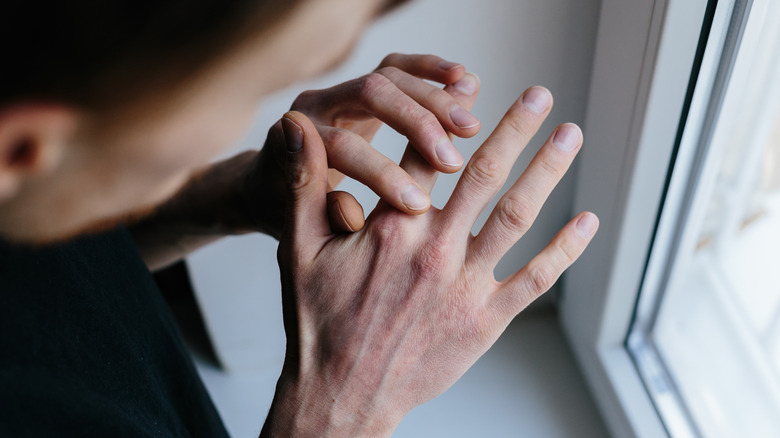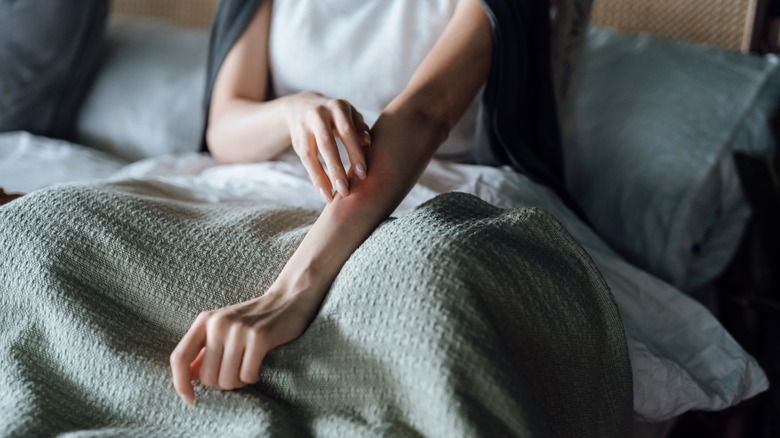What It Means When Your Fingers Itch
Your skin is not just a physical barrier but also a sensory one too. It constantly gathers and relays information about your surroundings to your brain, which helps you sense temperature, pressure, and pain, according to KidsHealth. Sometimes, your skin sends a different kind of message, in which you feel the urge to scratch or relieve an annoying itch. This sensation, known as pruritus, is caused by the activation of certain nerve fibers in your skin that send signals to your brain, causing that annoying itchiness, says the Cleveland Clinic.
When your fingers are itchy, it can feel uncomfortable and difficult to ignore. The intensity of the itch can vary. It can be mildly annoying to severe and persistent. Nonetheless, there are several possible explanations, including both physical and psychological ones. According to Medical News Today, common causes of itchy fingers may include skin conditions such as eczema and psoriasis. Other possible causes include underlying medical conditions like diabetic peripheral neuropathy and more. In this article, we'll explore some of these possible causes in detail. We'll also look into the available treatment options and lifestyle changes you can make to help alleviate the itching of your fingers.
The various causes of itchy fingers
A common cause of finger itching is contact dermatitis, says Medical News Today. If you come into contact with a substance that triggers an allergic reaction or irritates your skin, you may develop this condition. It can occur anywhere on your body, but it is most commonly found on your hands, face, lips, and armpits, as per the Cleveland Clinic. Contact dermatitis has two main types: allergic contact dermatitis and irritant contact dermatitis. Allergic contact dermatitis occurs when your immune system reacts to a substance that it recognizes as foreign. On the other hand, irritant contact dermatitis occurs when your skin is directly exposed to a substance that damages or irritates the skin.
Another possible physical cause of finger itching is dyshidrotic eczema. If you have this condition, you may experience small, clear blisters on your hands and feet that are itchy and painful. While the exact cause is not entirely understood, stress, exposure to certain chemicals or allergens, and sweating can trigger or worsen symptoms, according to the National Eczema Association.
On top of that, finger itching can be a symptom of a more serious medical condition, such as psoriasis or nerve damage. These conditions can cause chronic itching and discomfort in the fingers and require medical treatment. In addition to physical causes, finger itching can have psychological causes, such as stress, anxiety, and other emotional factors, says Medical News Today.
Treatment options for itchy skin
While some causes can be easier to address, others may require medical attention. If you experience persistent finger itching or other symptoms, it always helps to consult with your doctor early. They can help determine the underlying cause and appropriate treatment. Indeed, finding relief can feel like a challenge when dealing with itchy skin. Luckily, many treatment options are available to help you find relief and restore your comfort.
Suppose an allergic reaction or contact dermatitis causes your itchy skin. In that case, antihistamines can help reduce inflammation and block the release of histamine, the chemical that causes itching, says Medical News Today. Your doctor might also prescribe a corticosteroid cream. Suppose you have a severe case of itchy skin caused by conditions such as eczema or psoriasis. In that case, prescription medications may be needed to target the underlying cause of the itching and reduce inflammation.
In addition to medical treatments, your doctor might suggest a few lifestyle changes. For example, you should use gentle, fragrance-free soaps and drink plenty of water to keep your body hydrated. It's also crucial to avoid scratching the affected area to prevent further irritation. Lastly, try to identify and avoid triggers causing the itching. This could include certain foods or environmental allergens. By keeping a journal to track your symptoms and potential triggers, you can better understand what's causing your itchy skin and take steps to prevent it from occurring.



